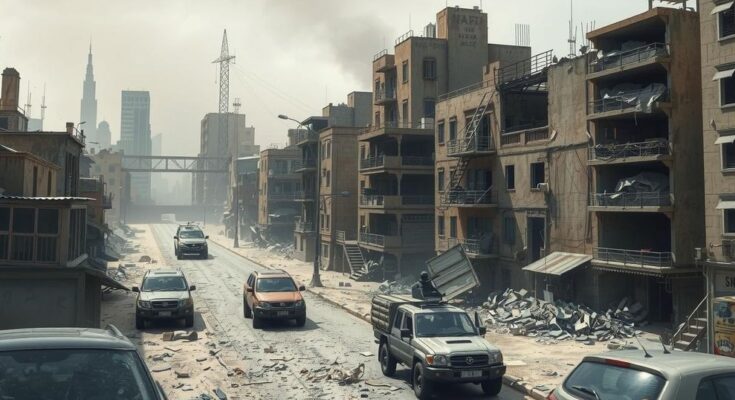The Sudanese army claims control over strategic areas in central Khartoum, including the Nile Towers and Sherwani Bus Station, amidst ongoing conflict with the RSF. Despite these gains, RSF Commander Hemedti insists his forces will not withdraw. The conflict has caused significant casualties and displacement, raising concerns over a looming humanitarian crisis in Sudan.
The Sudanese army announced on Sunday its control over key locations in central Khartoum from the paramilitary Rapid Support Forces (RSF). According to the military, strategic sites such as the Nile Towers and Al Mansheiya Bridge were seized, along with the Sherwani Bus Station, the largest transit hub in the area. Activists circulated videos online that showcased Sudanese soldiers conducting patrols around these sites.
This recent territorial gain allows the army to be in closer proximity to significant locations like the Army Command Center and the Presidential Palace. Notably, there has been no immediate response from the RSF regarding these developments. Meanwhile, RSF Commander Mohamed Hamdan Dagalo stated in a video that his forces intend to remain in Khartoum and at the Presidential Palace, which they have occupied since the conflict’s onset.
Over recent weeks, the RSF’s territorial grip has notably diminished as the Sudanese army has expanded its control across various regions, including Khartoum and six additional states. In Khartoum state, the army has gained control over Bahri City, a substantial portion of Omdurman City, and approximately 75% of central Khartoum City. The RSF retains control of parts of the eastern and southern areas.
Since mid-April 2023, the ongoing conflict has resulted in over 20,000 fatalities and displaced 14 million individuals, according to data from the UN and local authorities. However, research from U.S. institutions suggests a significantly higher death toll of about 130,000. With the humanitarian crisis escalating, there are increasing international calls for a resolution to the conflict, as millions risk starvation and death due to severe food shortages, and the combat has now affected 13 of Sudan’s 18 states.
In summary, the Sudanese army has successfully captured critical positions in central Khartoum from the RSF, enhancing its strategic reach within the capital. Despite the RSF’s claims of continued control, the territorial landscape is shifting in favor of the army, reflecting a broader trend of territorial loss for the RSF in recent weeks. As the conflict persists, the humanitarian situation in Sudan continues to deteriorate, prompting urgent appeals for resolution.
Original Source: www.yenisafak.com




